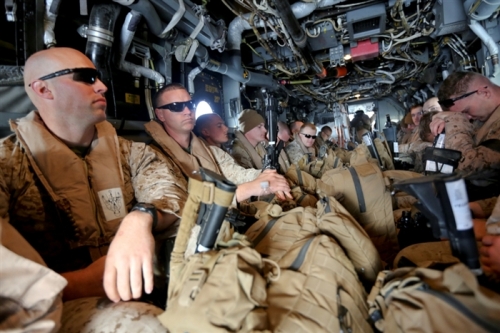Last week, Marines from Special Purpose Marine Air Ground Task Force – Crisis Response (SPMAGTF-CR) conducted a training exercise in Morocco, in conjunction with the annual African Lion bilateral training exercise. On 3 April 2014, Marines from SPMAGTF-CR flew in two MV-22B Osprey aircraft from Moron Air Base in Spain to Tifnit, Morocco. On arrival, the Marines set up security for a hypothetical United States government compound to protect US citizens and property within.

Marines from Special Purpose Marine Air Ground Task Force – Crisis Response board an MV-22B Osprey for a training exercise in Tifnit, Morocco on 3 April 2014.
The training event is yet another instance where the capabilities of SPMAGTF-CR have been highlighted as of late. The unit was created last spring in the wake of the attack on the US consulate in Benghazi, Libya in September 2012. Since then, the Marines have forward deployed to Djibouti and Uganda to be able to respond to the crisis in South Sudan. More recently, Marines from SPMAGTF-CR have deployed to Romania to reinforce US units in that region. Officially that deployment has nothing to do with the ongoing crisis in Ukraine.
African Lion, which ended last Saturday, is also an important annual bilateral training exercise with Morocco, which has a long history of cooperation with the US, dating back to the American Revolution. African Lion dates back at least to the 1990s, at which time it was a biennial exercise sponsored by US European Command (EUCOM) and conducted by the Southern European Task Force (SETAF). US Marine Corps Forces, Europe (MARFOREUR) subsequently took over the exercise in the 2000s.
With the creation of US Africa Command (AFRICOM) in 2008, EUCOM relinquished responsibility for the exercise. Marine Corps Forces, Africa (MARFORAF) also took over the actual conduct of the event. The annual exercise also involves members from other US military services, such as the Army and the Air Force, and is observed by numerous foreign partners.
This year, approximately 150 soldiers of the Royal Moroccan Armed Forces, 350 U.S. servicemembers participated in the African Lion exercise. The focus of African Lion 14 was on interoperability with military-to-military engagements in stability operations, rapid response to contingencies, a multinational observer program with 13 different countries, non-lethal weapons and peace enforcement, live-fire and weapons familiarization training, humanitarian and disaster-relief response. Other nations observing the exercise included: Belgium, Egypt, France, Germany, Italy, Mauritania, the Netherlands, Poland, Portugal, Tunisia, Turkey, Spain, Senegal, and the United Kingdom.